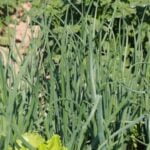Are you on the lookout for a weed and grass killer safe for vegetable gardens? Keeping your vegetable garden free from weeds and grass is essential for maintaining its health and productivity.
In this article, we will explore the importance of weed and grass control in vegetable gardens, the risks of using conventional weed killers, and the benefits of opting for natural or organic alternatives. We will also discuss the types of safe weed and grass killers available, provide tips on their proper use, and recommend some top options to consider.
A thriving vegetable garden requires careful attention to weed and grass control. Weeds compete with vegetables for water, nutrients, and sunlight, which can affect plant growth and yield. Additionally, some invasive plants can harbor pests or diseases that may harm your crops. Therefore, it’s crucial to keep your garden free from these unwanted plants in order to ensure a successful harvest.
While traditional weed killers may effectively eliminate weeds and grass, they often contain harmful chemicals that can pose risks to human health and the environment. When used in vegetable gardens, these chemicals can leach into the soil and potentially contaminate your produce. As a result, many gardeners are turning to natural or organic alternatives that are safe for both their crops and the environment.
The Risks of Using Conventional Weed and Grass Killers in Vegetable Gardens
The use of conventional weed and grass killers in vegetable gardens poses significant risks to both the plants and the individuals consuming the produce. Many of these products contain harmful chemicals that can seep into the soil and be absorbed by the vegetables, leading to potential health hazards for anyone who consumes them. Additionally, these chemicals can also harm beneficial insects and microorganisms in the soil, disrupting the delicate balance of the garden ecosystem.
Some of the common risks associated with using conventional weed and grass killers in vegetable gardens include:
- Chemical residue on vegetables
- Soil contamination
- Harm to beneficial insects and microorganisms
- Health hazards for gardeners
Furthermore, these chemical-based weed and grass killers have been linked to long-term environmental damage, as they can leach into groundwater or run off into nearby water bodies, affecting not only the immediate garden area but also the surrounding ecosystems. It is crucial for gardeners to understand these risks when considering methods for weed and grass control in their vegetable gardens.
In response to these risks, many gardeners are turning to natural or organic alternatives that are safe for vegetable gardens. By opting for non-toxic weed and grass killers, gardeners can effectively manage weeds without compromising the safety of their vegetables or the surrounding environment.
The Benefits of Using Natural or Organic Weed and Grass Killers in Vegetable Gardens
Using natural or organic weed and grass killers in vegetable gardens can offer numerous benefits that conventional chemical-based products cannot. Here are some reasons why choosing natural or organic options is a great idea:
1. Environmental Friendly: Natural and organic weed and grass killers are made from plant-based ingredients, making them less harmful to the environment compared to their chemical counterparts. They break down naturally without leaving toxic residues in the soil, water, or air.
2. Safe for Beneficial Insects: Chemical weed and grass killers can harm beneficial insects such as bees and ladybugs, which play a crucial role in pollination and pest control. Natural or organic options do not have the same negative impact on these helpful organisms.
3. Healthier Produce: Using natural or organic weed and grass killers ensures that no harmful chemicals seep into the soil and get absorbed by the plants. This means that you can enjoy healthier and safer produce from your vegetable garden.
By choosing natural or organic weed and grass killers for your vegetable garden, you are not only safeguarding the health of your family but also contributing to a more sustainable and eco-friendly gardening practice.
Types of Weed and Grass Killers That Are Safe for Vegetable Gardens
Vegetable gardeners understand the constant battle against weeds and grass that can threaten the health and productivity of their plants. While conventional weed and grass killers may effectively eliminate unwanted vegetation, they also pose risks to the safety of vegetable gardens. Chemical herbicides can leach into the soil and potentially contaminate the vegetables, causing harm to both humans and the environment. This has led many gardeners to seek out natural or organic alternatives that are safe for their vegetable gardens.
Fortunately, there are several types of weed and grass killers that are safe for vegetable gardens. One option is a vinegar-based herbicide, which contains acetic acid as its active ingredient. This natural substance effectively kills weeds by drying them out, making it a popular choice for eco-friendly gardeners.
Another safe alternative is using corn gluten meal, a byproduct of corn processing that suppresses the growth of weeds by inhibiting root development. Additionally, essential oils such as clove oil, citronella oil, or peppermint oil can be used as effective natural herbicides.
These safe weed and grass killers offer an environmentally friendly way to maintain a healthy vegetable garden without compromising the safety of the produce. By choosing natural or organic options, gardeners can effectively manage unwanted vegetation while promoting sustainable and chemical-free practices in their gardening routines.
| Weed and Grass Killer Type | Active Ingredient |
|---|---|
| Vinegar-based herbicide | Acetic acid |
| Corn gluten meal | Inhibits root development |
| Essential oils (clove oil, citronella oil, peppermint oil) | Natural plant extracts |
How to Use Weed and Grass Killers Safely in Vegetable Gardens
When it comes to using weed and grass killers in vegetable gardens, safety is of utmost importance. Many gardeners are hesitant to use conventional weed and grass killers for fear of potential harm to their vegetables. However, it is possible to use these products safely with the right precautions.
To start, it is essential to carefully read and follow the instructions on the label of any weed and grass killer that you choose to use in your vegetable garden. Make sure to wear protective clothing, such as gloves and long sleeves, when applying the product. It is also advisable to avoid using weed and grass killers on windy days to prevent the spray from drifting onto your vegetable plants.
In addition, consider using natural or organic weed and grass killers that are specifically formulated to be safe for vegetable gardens. These products often contain ingredients like citric acid or vinegar, which target weeds while leaving your vegetables unharmed. Remember that even natural products should be used with caution, so always follow the directions on the packaging.
| Safe Weed and Grass Killers | Description |
|---|---|
| Citric Acid-Based Weed Killer | A natural alternative that effectively targets weeds without harming vegetable plants. |
| Vinegar-Based Weed Killer | Contains acetic acid, which can kill weeds on contact while being safe for use around vegetables. |
Top Recommended Weed and Grass Killers Safe for Vegetable Gardens
When it comes to maintaining a vegetable garden, keeping weeds and grass at bay is essential for the health and productivity of the plants. However, using conventional weed and grass killers can pose risks to the vegetables that are being grown. This is why many gardeners are turning to natural or organic alternatives that are safe for vegetable gardens.
Benefits of Natural or Organic Weed and Grass Killers
One of the main benefits of using natural or organic weed and grass killers in vegetable gardens is that they do not contain harmful chemicals that can be absorbed by the vegetables. These alternatives typically use ingredients such as vinegar, citrus oils, or plant-based enzymes to effectively control weeds and grass without posing a risk to the surrounding plants.
Types of Safe Weed and Grass Killers
There are several types of natural or organic weed and grass killers that are safe for vegetable gardens. Some come in ready-to-use sprays, while others are concentrated formulas that can be diluted with water. Additionally, there are options like corn gluten meal which acts as a pre-emergent herbicide, preventing weed seeds from germinating.
Tips for Using Weed and Grass Killers Safely
When using any type of weed and grass killer in a vegetable garden, it’s important to follow the instructions carefully. This includes applying the product on a dry day when rain isn’t expected, avoiding spraying on windy days to prevent drift onto vegetables, and wearing protective clothing such as gloves and goggles. Additionally, it’s crucial to only apply these products on actively growing weeds and grasses while keeping them away from desired plants.
Overall, making use of safe weed and grass killers in a vegetable garden ensures that unwanted vegetation can be controlled without putting the health of the vegetables at risk. By selecting natural or organic options, gardeners can maintain a thriving vegetable garden while minimizing potential harm from toxic chemicals.
Tips for Maintaining a Weed and Grass-Free Vegetable Garden
Regular Maintenance
One of the most effective ways to maintain a weed and grass-free vegetable garden is through regular maintenance. This includes removing any weeds or grasses that sprout up as soon as you notice them. By doing this regularly, you can prevent these unwanted plants from competing with your vegetables for nutrients and sunlight.
Mulching
Another tip for maintaining a weed and grass-free vegetable garden is to use mulch. Mulching not only helps retain soil moisture and regulate soil temperature, but it also acts as a barrier that prevents weed seeds from germinating and growing. Organic mulches, such as straw, wood chips, or compost, can be particularly beneficial for vegetable gardens as they can also add nutrients to the soil as they break down.
Companion Planting
Consider implementing companion planting in your vegetable garden to naturally deter weeds and grasses. For example, planting marigolds around the perimeter of your garden can help repel certain types of pests that may bring in weed seeds. Additionally, some plants like basil or oregano release oils into the soil that inhibit the growth of weeds.
By following these tips for maintaining a weed and grass-free vegetable garden, you can ensure that your crops have the best chance to thrive without having to compete with unwanted plants. Implementing natural or organic weed and grass killers alongside these practices can further enhance the health and productivity of your vegetable garden without posing any harm to your edible crops.
Case Studies
In conclusion, the use of weed and grass killers that are safe for vegetable gardens is essential in maintaining a healthy and productive garden. As discussed in this article, conventional weed and grass killers pose significant risks to the health of both plants and humans, making natural or organic alternatives a preferable choice.
The benefits of using safe weed and grass killers in vegetable gardens cannot be overstated, as they help keep the garden free from invasive plants without compromising the safety of the produce.
By opting for natural or organic weed and grass killers, gardeners can effectively manage weed and grass growth while also safeguarding the environment. These products not only target unwanted vegetation but also nourish the soil, ensuring that vegetables thrive without being exposed to harmful chemicals. With an increasing awareness of the importance of sustainable and eco-friendly practices, the demand for safe weed and grass killers for vegetable gardens continues to grow.
In light of this information, it is crucial for gardeners to educate themselves on the types of safe weed and grass killers available, as well as how to properly use them. By adhering to best practices and utilizing recommended products, vegetable gardeners can achieve success in maintaining a thriving garden that is free from invasive plants.
Ultimately, by sharing success stories and experiences with safe weed and grass killers in vegetable gardens, we can inspire others to prioritize the health and well-being of their gardens by choosing environmentally friendly solutions.
Frequently Asked Questions
Can I Use Weed and Grass Killer in My Vegetable Garden?
Using weed and grass killer in a vegetable garden is generally not recommended. These products can contain chemicals that may be harmful to both the plants and the people consuming them. It’s best to opt for safer, more natural alternatives.
What Weed Killer Is Safe for Vegetables?
When looking for a safe weed killer for vegetables, consider using organic or homemade solutions. For example, vinegar, salt, or boiling water can be effective at killing weeds without posing a risk to your vegetable plants. Plus, these options are environmentally friendly.
How Do I Kill Grass and Weeds in My Vegetable Garden?
Killing grass and weeds in a vegetable garden can be done through manual removal, mulching, or using organic herbicides. Pulling weeds by hand or using tools like hoes can help get rid of unwanted plants without introducing harmful chemicals into your garden.
Additionally, applying mulch can help suppress weed growth while adding nutrients to the soil. Organic herbicides made from natural ingredients are another option for controlling weeds and grass in a vegetable garden without harming the vegetables themselves.

If you’re looking to get into vegetable gardening, or are just looking for some tips on how to make your current garden better, then you’ve come to the right place! My name is Ethel and I have been gardening for years. In this blog, I’m going to share with you some of my best tips on how to create a successful vegetable garden.





